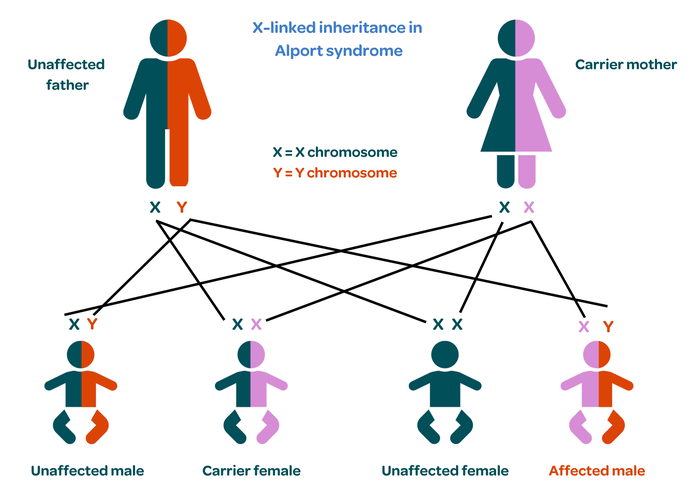What is Alport syndrome?
Alport syndrome is a rare genetic condition that mainly affects the kidneys and hearing. It is named after the doctor who first identified the condition in 1927, Dr Arthur Cecil Alport.
Alport syndrome occurs when there is a problem with one of the important fibres that make up a membrane in the tiny filters of the kidneys. This makes the kidneys ‘leaky’ and affects their ability to filter the blood. Over time this can cause scarring and kidney damage. There is a similar membrane in the inner ear, so hearing is also affected.
Alport syndrome affects around 1 in 5,000 people in the UK. Men are more likely to be affected than women.
What are the signs and symptoms of Alport syndrome?
Hearing loss is often one of the first signs of Alport syndrome and is usually first noticed in boys around the age of ten.
Other symptoms of Alport syndrome include:
- Blood in the urine (haematuria) – the urine may look red or dark brown (like a cola drink). It does not cause any pain and may start after an infection such as a cold. The haematuria may be invisible to the naked eye but can be seen under a microscope (microscopic haematuria) or when tested by dipping a specially treated paper strip into your urine (urine dipstick).
- Protein in the urine (proteinuria) – this is likely to only be seen under a microscope or on the urine dipstick test, but if there is a lot of protein, the urine may look frothy.
- High blood pressure.
Most men with Alport syndrome develop kidney failure in their twenties or thirties. Women are less likely to get kidney failure, although it can still happen in later life.
What causes Alport syndrome?
Alport syndrome is caused by a fault in the gene COL4A5 that makes one of the fibres (Collagen IV) that form the kidneys filtering system.
Without normal Collagen IV, the kidneys’ filtering membrane is weakened causing it to leak. The body will try to repair the weakened filters, however, over time the filters become scarred and can no longer function. Kidney function will then decline.
Collagen IV is also essential in the inner ear in the cochlear membrane. This transmits sound vibrations to the nerve sensors in the ear. The weakening of this membrane eventually leads to hearing loss.
How is Alport syndrome diagnosed?
Alport syndrome is usually diagnosed by:
- checking the urine for signs of kidney damage
- reviewing the family history for evidence of previous kidney problems
- testing the hearing, especially in boys
A kidney biopsy can confirm the diagnosis and genetic testing may also be offered if there is a family history of the condition.
The earlier the diagnosis the made, the better the chance of maintaining kidney function.
Does Alport syndrome affect other parts of the body?
Alport syndrome can cause hearing difficulties in boys. These are usually first noticed around the age of ten. A hearing test (audiogram) will likely show hearing loss for high-pitched sounds such as speech. The ability to hear lower sounds is less affected. Both ears are likely to be affected.
Once hearing loss has started, it usually gets gradually worse over the next ten years. Overall hearing loss is moderate, and it is unusual for someone with Alport syndrome to become completely deaf.
As children with Alport syndrome have normal hearing at birth, their speech develops normally.
Girls are rarely affected by hearing loss as they are almost always carriers of Alport syndrome rather than having the condition themselves.
Some people with Alport syndrome also have problems with their eyes. These are usually minor and are easily treated. They tend to occur in adults rather than children, and rarely lead to problems with vision. Small white flecks can sometimes be seen around the retina (the inner part) of the eye. These flecks do not affect the vision but can help with the diagnosis of Alport syndrome. In some cases, the lens of the eye becomes cone-shaped and cause short-sightedness.
Does Alport syndrome run in families?
In the majority of cases, Alport syndrome occurs due to a fault in a gene called COL4A5 which is found on the X chromosome. Women have two X chromosomes, so the healthy gene compensates for the damaged one. However, men only have one X chromosome so have no back up if the gene is damaged. Men are therefore more likely to be affected by and have more severe cases of Alport syndrome than women.
Women with one damaged COL4A5 gene are known as carriers. They can pass the condition onto their children but are unlikely to be affected themselves, or to only have minor issues. Mothers of Alport boys, for example, are always carriers of the condition.

How is Alport syndrome treated?
Kidney function reduces slowly in people with Alport syndrome, so it is important to have regular health checks to monitor progress.
Treatment focuses on medication to reduce blood pressure to help maintain kidney function. These medications are likely to be a type of Angiotensin Converting Enzyme (ACE) inhibitors which work by reducing scarring in the kidneys so that they last longer.
Various lifestyle adjustments may also be recommended to help maintain overall wellbeing. These include:
- Avoid smoking. Smoking damages the blood vessels in the kidneys and speeds up kidney damage.
- Eat a balanced diet. It is especially important to limit the amount of salt in the diet as too much salt can cause high blood pressure.
- Exercise regularly to help to control blood pressure.
Hearing aids may be prescribed to help with hearing loss, especially in school or college. Care should be taken around prolonged loud noises such as building sites or nightclubs, as this can further damage hearing. Headphone volume should also be controlled to avoid damage.
Alport syndrome can eventually lead to kidney failure and the need for dialysis or a kidney transplant. People with Alport syndrome usually respond well to transplantation and the condition does not recur in the new kidney.
Hearing is likely to slightly improve after a transplant.
Where can I get more information or support about Alport syndrome?
For more information on Alport syndrome, including its genetics, diagnosis, symptoms and treatment, visit alport UK, a patient-led organisation dedicated to empowering people living with Alport syndrome to enjoy the best possible quality of life.

Publication date: 11/2023
Review date: 11/2026
This resource was produced according to PIF TICK standards. PIF TICK is the UK’s only assessed quality mark for print and online health and care information. Kidney Care UK is PIF TICK accredited.